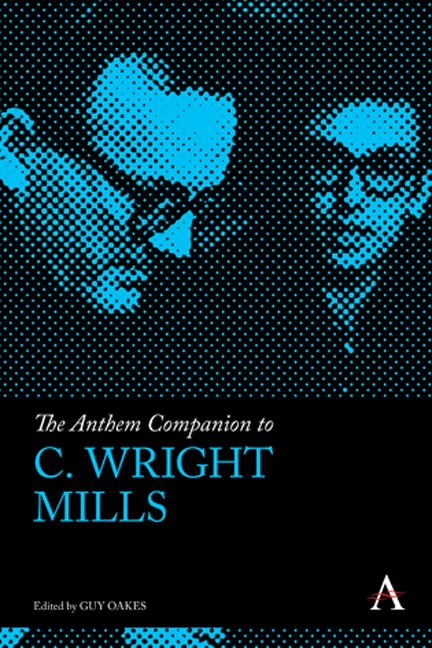Book contents
- Frontmatter
- Contents
- List of Tables
- Acknowledgments
- Introduction American Faust
- Chapter 1 C. Wright Mills on Law and Society: Hidden in Plain Sight?
- Chapter 2 Mills on the Economics of the Old Middle Class
- Chapter 3 Revisiting C. Wright Mills on the Militarization of Postwar American Society
- Chapter 4 A Critical Assessment of the Historical and Economic Underpinnings of C. Wright Mills's The Power Elite
- Chapter 5 Mills as Ethical Theorist: The Military Metaphysics and the Higher Immorality
- Chapter 6 C. Wright Mills and Latin America
- Chapter 7 For a Feminist Sociological Imagination: A Personal Retrospective on C. Wright Mills
- Chapter 8 The Sociological Imagination: A Reductionist Reading
- Chapter 9 Recent Changes in the Shape of Power
- Afterword. Mills as Classic?
- Contributors
- Index
Chapter 1 - C. Wright Mills on Law and Society: Hidden in Plain Sight?
Published online by Cambridge University Press: 17 June 2017
- Frontmatter
- Contents
- List of Tables
- Acknowledgments
- Introduction American Faust
- Chapter 1 C. Wright Mills on Law and Society: Hidden in Plain Sight?
- Chapter 2 Mills on the Economics of the Old Middle Class
- Chapter 3 Revisiting C. Wright Mills on the Militarization of Postwar American Society
- Chapter 4 A Critical Assessment of the Historical and Economic Underpinnings of C. Wright Mills's The Power Elite
- Chapter 5 Mills as Ethical Theorist: The Military Metaphysics and the Higher Immorality
- Chapter 6 C. Wright Mills and Latin America
- Chapter 7 For a Feminist Sociological Imagination: A Personal Retrospective on C. Wright Mills
- Chapter 8 The Sociological Imagination: A Reductionist Reading
- Chapter 9 Recent Changes in the Shape of Power
- Afterword. Mills as Classic?
- Contributors
- Index
Summary
During her 2001 presidential address to the annual meeting of the Law and Society Association (held jointly that year with its European counterpart in Budapest, Hungary), Kitty Calavita invoked the memory and work of C. Wright Mills (Calavita 2002) in service of encouraging her audience to reflect on the important role of the public intellectual in contemporary sociolegal studies, and to urge them to consider a place for “engaged research” in their own scholarship. Just one year before, in his presidential address to the same association – and largely for the same reasons – then-president Frank Munger also cited to the work of Mills (Munger 2001). Why Mills?
Although Mills died in 1962, two years before the Law and Society Association was founded, it would seem that he has not been forgotten. As Stanley Aronowitz observed in 2003, with the coming of the new century, we also were witness to something of a “revival” of interest in Mills's work (Aronowitz 2003, 67). Munger and Calavita, both trained as sociologists, might have been tapping into – and simultaneously contributing to – this revival. Their references to Mills might have been a kind of academic “shorthand” gesturing to the “Mills brand” (Oakes 2014) as a way to situate a larger message. Mills is offered up as the “daring iconoclast: the Texas intellectual who wrote by riding and shooting, the unflinching advocate of a ‘politics of truth,’ determined to counter the distortions of salesmanship, advertising, public relations, and propaganda with hard truths about the social realities of his time” (Oakes 2014, 253). However, it also seems reasonable to believe that there might have been something more than a Mills revival, or scholarly name checking, at work, informing the intellectual references of both speakers. That is, given the subject matter of their respective addresses – on the place of engaged, activist socio-legal scholarship in the academic work of the members of the Law and Society Association – and given the history and orientation of the association itself, the references by Munger and Calavita should probably not be too surprising. Law and Society is an interdisciplinary professional association that was founded in the early 1960s out of a desire to help foster the production of scholarship that might guide progressive legal reform measures and with an ongoing concern for social justice issues.
- Type
- Chapter
- Information
- The Anthem Companion to C. Wright Mills , pp. 17 - 40Publisher: Anthem PressPrint publication year: 2016



